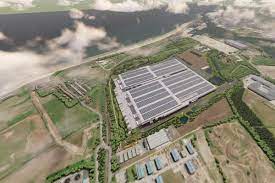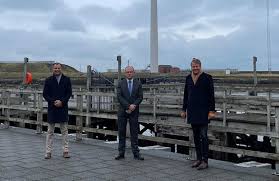- History man - 3rd March 2026
- British Broadcasting Complaint (BBC) - 3rd March 2026
- Rocket man - 2nd March 2026

The people behind a multi-million pound scheme in a deprived part of Wales which has been compared with questionable initiatives (including one backed by the associate of a fraudster which pulled out of the country), were warned about the risks of building their controversial development in a former coal mining area.
In part of the reply from UK Coal to the planning application for Rhydycar West they were told that the mining legacy: “…poses a risk to the proposed development and…investigations are required along with remedial measures, in order to ensure the safety and stability of the proposed development”..

Yet the project itself sounds almost too good to be true. It declares on its website (which proclaims it is “FOR ALL YEAR ROUND”): “The plans for Rhydycar West, located adjacent to the existing BikePark Wales site (just 2km north), include an indoor waterpark, indoor and outdoor adventure park, 400 m long indoor ski slope and luxury lodging including a spa and woodland lodges. It will cost as (sic) estimated £300m to build, but hopes to create 800 jobs locally, and bring £38m into the local economy annually.”.

However one observer said: “Everything may be above board, but to outsiders it looks like another plan to extract money from the Welsh government just like other schemes such as the racing circuit and airport. Merthyr council have enough problems to resolve without fanciful dreams. No doubt the Senedd will pick up the tab. The big question is why anyone would ever want to come to holiday in this grim location?“.

A senior Welsh civil servant stated to The Eye: “This could all be perfectly legitimate, but this may be public money at stake here if grants are involved. We don’t want to be in another BritishVolt situation”. This is a reference to contentious plans by BritishVolt (BV) to build a large battery plant in the Vale of Glamorgan, who we revealed had a dubious individual as a director, with another one having until recently lived in a modest apartment at Lily Street in Cardiff, which appeared to be a terraced house converted into flats. BV ultimately pulled out of Wales altogether.

The Eye were alone in raising major questions about BV, but huge fanfare greeted their now-scrapped plan to come to a former RAF base in Bro Tathan near St Athan for its battery factory. This reversal came despite the fact that the ‘Chief Executive’ at the time (Orral Nadjari) claimed he had looked at more than 100 sites.
The organisation’s original Chairman and co-founder, Lars Carlstrom, had been involved in a coach company at Coventry that was in debt to creditors for around £1 million. He had also been director of a watch manufacturer called Thrupp and Maberly which has now been dissolved.
![]()

In 2011 it had first come to light that Mr Carlstrom was the “representative in Sweden“ of Vladimir Antonov who had been jailed for fraud. Mr Carlstrom was involved, too, in a sale and leaseback deal of property and plant belonging to the Swedish car maker Saab.
At an extradition hearing, the former ‘representative’ of Mr Carlstrom, Russian-born Mr Antonov, who once owned Portsmouth FC, said that the charges against him were part of a politically-motivated plot. Mr Antonov, whose father was shot and injured in Russia in 2009 over a suspected business dispute, claimed that he was at risk of attack in prison if he was sent abroad to stand trial.

Apart from associations such as this, Mr Carlstrom was also handed a four-year trading ban in the late 1990s, and later, too, was accused of acting negligently by Sweden’s tax authority over a separate unpaid bill for one of his companies in 2011. In leaving BV, he said: “I don’t wish to become a distraction”
After all of this, BV’s Chief Strategy Officer at the time, Isobel Sheldon, said the operation was severing ties with Mr Carlstrom.

Most of the media (apart from The Eye), acclaimed the news that BV was supposedly coming to Wales. For example, BBC Cymru Wales (BBC CW) declared: “The firm behind a proposed battery factory which could create 4,000 jobs has listed a site in Wales as its ‘preferred option’”.
The website WalesOnline (WO) published: “Plans for a giant factory and thousands of jobs for the Vale of Glamorgan have been revealed. Battery manufacturer Britishvolt announced … that two sites are in the running for their factory, with Bro Tathan business park (near St Athan) leading the way”. It stated later: “Plans for a factory producing electric car batteries that would bring thousands of jobs for the Vale of Glamorgan have moved a step closer.”.

This was The Times: “Ambitious plans have been revealed for Britain’s first gigafactory capable of producing enough fuel cells and battery packs to power 100,000 zero carbon electric cars. The project in south Wales, which is designed to put the UK in the race to be a global hub for the electrified vehicle industry, comes from Britishvolt, a start-up company founded by a Swedish automotive entrepreneur best known as a former associate of Vladimir Antonov, the jailed Russian businessman. Britishvolt has unveiled plans to build a gigafactory capable of producing 10 gigawatt hours (GWh) of lithium ion batteries a year from early next year at Bro Tathan, on the Cardiff airport commercial complex where Aston Martin Lagonda has opened its new carmaking factory.”

The scheme for South Wales, though, was soon stopped by BV, yet crucial facts about the men behind it could have been easily discovered. Perhaps emphasising what happened, our research could find no record of any director having a background in battery manufacturing.
When BV pulled out of Wales there was widespread disappointment. For instance, Neil Moore, leader of Vale of Glamorgan council said: “They were given a better deal elsewhere. I was surprised when they pulled out”.


BV had apparently acquired the Blyth site over the Welsh alternative because of better connections to renewable power sources such as windfarms in the North Sea, as well as an interconnector to Norway’s hydroelectric power – with timing difficulties in Wales also allegedly a factor.
Others, though, thought different issues were at work, and in the way the news of the ‘alternative location’ (Blyth) was welcomed, there would seem to be an uncanny echo of what happened in South Wales.

The Blyth Valley MP then, Ian Levy, stated: “This is an incredibly exciting announcement that will have a massive impact in the constituency and the surrounding area for decades to come”.
Unfortunately there would be no massive impact for the area or for anywhere else. In the Sunday Times (ST) it was published: “Britishvolt’s inevitable journey towards disaster has been, well, a very British story…The electric car battery factory planned for Blyth, near Newcastle, had no customers and no products. One of its founders had no automotive experience. The other had a conviction for tax fraud in the 1990s. Britishvolt wanted millions of taxpayers’ pounds for its gigafactory”.
As this report alludes to, the UK Government had committed a total of £100 million worth of taxpayers’ money to BV for the project, and it is understood the firm wanted to draw down nearly a third of the funding early, but officials refused.
![]() The website North East Bylines (NEB) had put it about Mr Carlstrom earlier: “He was the same individual whose track record had been queried by The Eyewhen reviewing the proposed location in Wales in July last year, and who seems still to be a major shareholder”.
The website North East Bylines (NEB) had put it about Mr Carlstrom earlier: “He was the same individual whose track record had been queried by The Eyewhen reviewing the proposed location in Wales in July last year, and who seems still to be a major shareholder”.

But as the report showed, our investigation featured in publications in the North East of England after the firm had proclaimed that it would not, after all, build the St Athan plant in the Vale of Glamorgan and move to Blyth instead.
The website said: “In July 2020 this (the plans for the battery factory) seemed a welcome bonus for Wales and the prospects of a large new green manufacturing capability with thousands of jobs could only be good news. Except, however, when doubts were quietly raised by The Eye, an investigative news and journalism website ‘looking into misdemeanours by organisations and individuals in Wales and the UK’”.

The ski slope scheme could be another welcome bonus for Wales creating plenty of jobs, except that they were warned that building in an old coal mining area ‘poses risks’, and public money may be handed over…
The memories of our Editor Phil Parry’s astonishing 41 year award-winning career in journalism (when the real information behind announcements was uncovered), as he was gripped by the rare neurological condition Hereditary Spastic Paraplegia (HSP), have been released in a major book ‘A GOOD STORY’. Order the book now!

Regrettably publication of another book, however, was refused, because it was to have included names.











